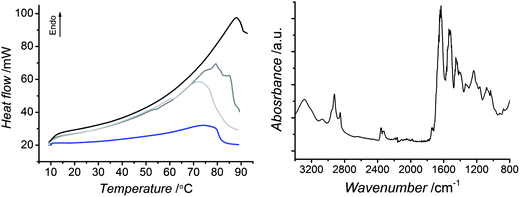Recombinant Collagen Thermal Stability Analysis Service
Recombinant Collagen Thermal Stability Analysis Service is a specialized evaluation service focused on the structural stability of recombinant collagen. Utilizing Differential Scanning Calorimetry (DSC), a highly sensitive thermal analysis technique, this service quantitatively investigates the thermal denaturation behavior of collagen. It is applicable to recombinant collagen produced from various expression systems (such as mammalian cells, E. coli, and yeast), as well as to fusion proteins, post-translationally modified collagen, and collagen-containing composite materials.
Thermal stability of recombinant collagen refers to its ability to maintain the triple-helical structure and functional integrity under varying temperature conditions. This property is critical for ensuring the solubility, structural integrity, and biomedical applicability of collagen, especially in fields like tissue engineering and regenerative medicine. Collagen is prone to heat-induced unfolding or aggregation at elevated temperatures, which compromises its in vivo biological function and physical properties. Therefore, accurate evaluation of the thermal stability of recombinant collagen is essential for optimizing its storage conditions, manufacturing processes, and overall performance in end-use applications.

Tronci G. et al. J Mater Chem B. 2013.
DSC is a widely used thermal analysis technique that investigates the thermal behavior of a sample by measuring the temperature difference between the sample and a reference under controlled heating. During DSC analysis, both the sample and the reference are subjected to the same heating program, and any difference in heat flow is recorded as a function of temperature. This allows for accurate measurement of parameters such as the thermal transition temperature (Tₘ), denaturation profile, and melting point of proteins.
Leveraging DSC, MtoZ Biolabs offers Recombinant Collagen Thermal Stability Analysis Service to precisely determine the Tₘ and denaturation characteristics of recombinant collagen. This service enables comprehensive evaluation of collagen’s conformational stability under different formulations, pH conditions, buffer systems, and storage settings. It is well-suited for a variety of research applications, including product development, formulation optimization, quality control, and performance validation of biomaterials.
Analysis Workflow
The main workflow of Recombinant Collagen Thermal Stability Analysis Service is as follows:
1. Sample Reception and Preliminary Screening
Confirm the sample type, concentration, buffer system, and experimental requirements.
2. Buffer System Standardization
If necessary, unify pH and ionic strength to eliminate background interference.
3. DSC Test
Perform scanning at a defined heating rate and record heat flow changes.
4. Data Processing and Feature Extraction
Automatically calculate Tm and ΔH, and generate heat flow vs. temperature curves.
Service Advantages
1. Advanced Analysis Platform: MtoZ Biolabs established an advanced Recombinant Collagen Thermal Stability Analysis Service platform, guaranteeing reliable, fast, and highly accurate analysis service.
2. One-Time-Charge: Our pricing is transparent, no hidden fees or additional costs.
3. Professional Data Interpretation: Includes calculation of thermodynamic parameters and recommendations for stability classification.
4. One-Stop Technical Support: Seamlessly integrated with other analytical services such as purity, structural, and isoelectric point analyses.
Sample Submission Suggestions
Sample Type: Recombinant collagen solution (preferably in PBS or a neutral buffer) or lyophilized powder.
Sample Volume: We recommend submitting >100 µL per sample (concentration ≥ 1 mg/mL), or 0.1–1 mg of lyophilized powder.
Please indicate the buffer composition and sample handling history (e.g., freeze-thaw cycles, filtration).
If you have special requirements or are unsure about sample preparation, please contact us for specific guidance.
Applications
Application examples of Recombinant Collagen Thermal Stability Analysis Service:
Formulation Screening and Buffer System Optimization
Compare the effects of different pH levels, salt concentrations, and additives on Tₘ values.
Quality Control of Bulk and Final Products
Assess whether thermal behavior remains consistent across different production batches of collagen.
Conformational Verification After Structural Modification
Analyze the impact of tag fusion, crosslinking modifications, or protein variants on thermal stability.
Freeze-Drying and Freeze-Thaw Stability Studies
Evaluate protein stability under various cryoprotectant combinations.
Deliverables
1. Experimental Procedures
2. Relevant Instrument Parameters
3. Raw Data Files
4. Thermal Stability Analysis Results
How to order?







